Guide to Sarcoma for Allied Health Professionals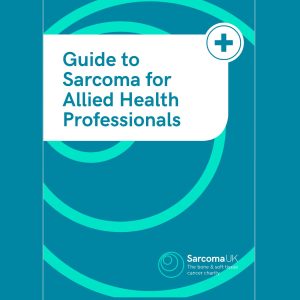
This guide is for allied health professionals who treat sarcoma patients but whose majority caseload is not sarcoma. It’s particularly relevant for those who work in the community with sarcoma patients who have been discharged from a specialist centre.
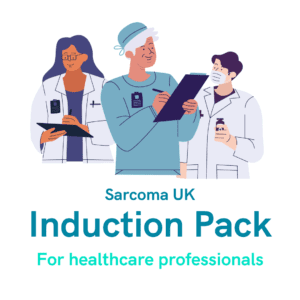 Sarcoma UK Induction Pack
Sarcoma UK Induction Pack
Sarcoma UK has put together an induction package that has the most up-to-date, trustworthy information for doctors, nurses, AHPs working with patients with sarcoma cancer.
The materials are online and can be requested by sending your details to hcp@sarcoma.org.uk
GP Diagnostic Toolkits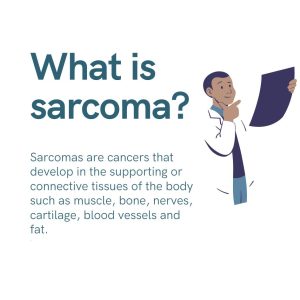
Sarcoma UK’s GP sarcoma diagnostic toolkit contains simple yet effective tools outlining the signs and symptoms of sarcoma and guidance on how to refer patients to sarcoma specialist health services for diagnosis and treatment.
 National Sarcoma Education Programme
National Sarcoma Education Programme
The National Sarcoma Educational Programme, hosted by the London Sarcoma Service and supported by Sarcoma UK hosts a monthly session for healthcare professionals to deepen and broaden their knowledge of sarcoma, thus improving patient care.
Sign up to attend future sessions
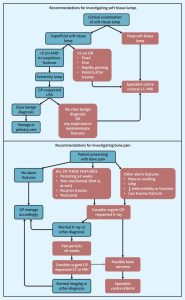
GP recommendations for investigating soft tissue lumps and bone pain.
Summary of recommendations for investigation of bone pain and soft tissue lumps in primary care. Blue boxes represent primary care management; red boxes represent specialist centre management; clear benign diagnosis refers to a confirmed reported diagnosis of a benign nature, for example, lipoma, with no additional suspicious or uncertain features. CT = computed tomography. MRI = magnetic resonance imaging. USS = ultrasound scan.
with permission, from Clinical activity in general practice before sarcoma diagnosis: an Australian cohort study, M. Rafiq et al,
Helping physiotherapists to spot signs of sarcoma

Sarcoma UK has produced an e-learning module for physiotherapists in collaboration with the University of Nottingham. This module is written specifically for physiotherapists who are practicing or training.
Sarcoma animation aimed at medical students
We firmly believe that education and research can drive positive change in sarcoma diagnosis, treatment, and overall awareness. We want to reach out to medical students and junior doctors and encourage them to watch our new animation video. By doing this, we aim to give them the knowledge needed to identify sarcoma’s symptoms, which we hope in turn will lead to quicker and more accurate diagnoses. Read more.
 ‘Sarcoma – Early Diagnosis’ – a course from GatewayC
‘Sarcoma – Early Diagnosis’ – a course from GatewayC
Sarcoma UK have worked with GatewayC, doctors and patients to develop a course for GPs and other primary care professionals.
The course aims to support GPs and other primary care professionals in recognising the symptoms of sarcoma and improve confidence in decision-making regarding referrals on a suspected cancer pathway.
Increasing Awareness of Soft-Tissue Sarcoma: Podcast of a Patient–HCP Discussion (Gillian Faskin & Sam Hackett)
National Sarcoma Survey 2025
The National Sarcoma Survey 2025 is the largest survey of people affected by sarcoma in the UK. Every five years, Sarcoma UK collects vital data to better understand the realities of sarcoma care, including diagnosis delays, treatment experiences, emotional support, rehabilitation and access to research.
Sarcoma – “…is it waking you up at night?”
In this episode, consultant orthopaedic oncological surgeon at The Robert Jones and Agnes Hunt Orthopaedic Hospital, Miss Gill Cribb joins GPs Rebecca Leon and Dr. Sarah Taylor to discuss the challenges of diagnosing sarcoma in primary care. Expect practical insights around clinical features, referral pathways, and safety netting for soft tissue and bone tumours, plus key history and examination tips and the importance of reassessing persistent or atypical musculoskeletal complaints. Real case studies highlight common pitfalls, coding dilemmas and the vital role of early investigation in improving outcomes for patients.
Study Days
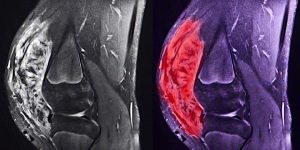 The next Sarcoma Study Day will take place on 7 November, hosted in a hybrid format by The Christie Institute for Cancer Education. You can attend in person at The Christie School of Oncology or join virtually, with on-demand access also available.
The next Sarcoma Study Day will take place on 7 November, hosted in a hybrid format by The Christie Institute for Cancer Education. You can attend in person at The Christie School of Oncology or join virtually, with on-demand access also available.
The day will deepen your understanding of multidisciplinary sarcoma care, covering radiotherapy, surgery, chemotherapy, toxicity management, and insights from the patient perspective. It’s ideal for healthcare professionals, including doctors, clinical nurse specialists, and allied health practitioners.
Learn more and sign up here.












